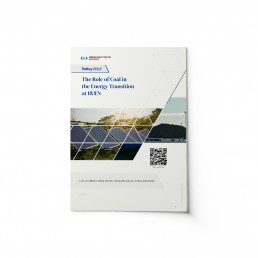Indonesia’s current energy needs are still highly dependent on fossil-based primary energy sources, namely coal, oil and natural gas. Energy mix data from the National Energy Council (DEN) shows that 91% of the national primary energy comes from fossil energy (coal 37.15%, petroleum 33.58%, natural gas 20.13%)4. Considering Indonesia as a net-importer since 2004, and the downward trend in daily oil production, the government has gradually reduced the share of petroleum in the national energy mix. The use of natural gas as an energy source also seems unsatisfactory due to the lack of gas infrastructure. The government thus relies on coal as the main energy source for power generation, industry, and also a source of state revenue.
It is very difficult to deny the role of coal in supporting energy supply and the Indonesian economy. On the other hand, the government needs to take serious action towards energy transition, which is to release dependence on fossil energy sources and switch to renewable energy gradually. Publish What You Pay (PWYP) Indonesia identifies three main reasons why Indonesian government needs to seriously develop an energy transition roadmap:
- Indonesia’s fossil resource reserves will run out in the next few decades.
- An unfriendly economic paradigm shifts with the development of business and investment in fossil energy while on the other side opening up space for renewable energy and its supporting industries to become more competitive.
- Global warming is driven by increased carbon emissions which are projected to trigger sea level rise and extreme climate disasters.
Government Regulation No. 29/2014 on the National Energy Policy (KEN) is the main subject of Indonesian government’s policy on energy. This policy is the basis for energy planning as stated in Presidential Regulation (Perpres) No. 22/2017 concerning the General National Energy Plan (RUEN). Following the policy hierarchy, RUEN becomes a reference for the Provincial and Regency Governments in preparing the General Regional Energy Plan (RUED).
By using the framework of arguments above, this policy brief aims to conduct a review of national policies in the energy sector, particularly to the Indonesian government’s energy policy scheme in the RUEN, related to the urgency of implementing the energy transition from fossil-based (especially coal) to renewable energy. This paper also reviews how the region (province) interprets RUEN into RUED and tries to identify the problems and challenges they face.
